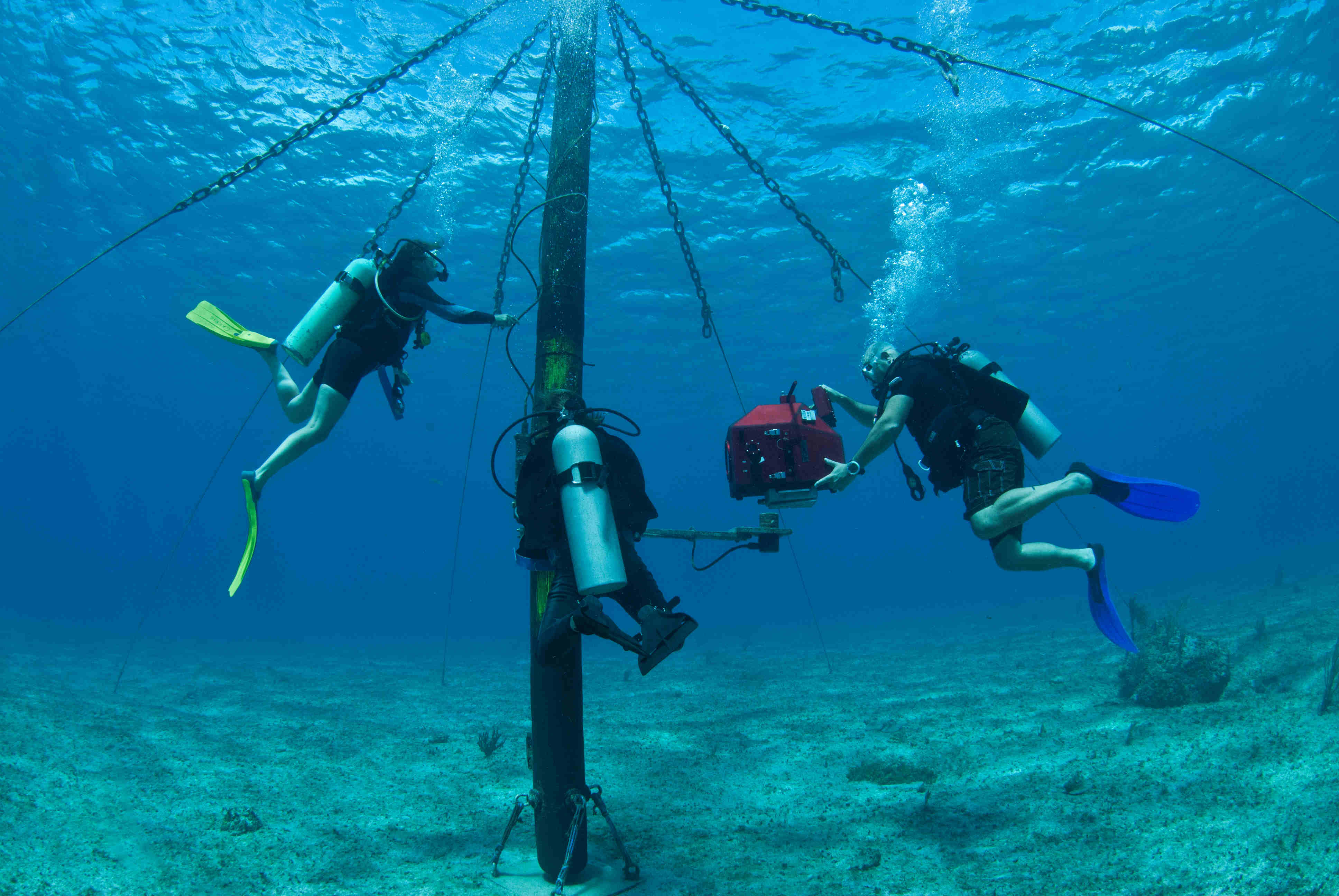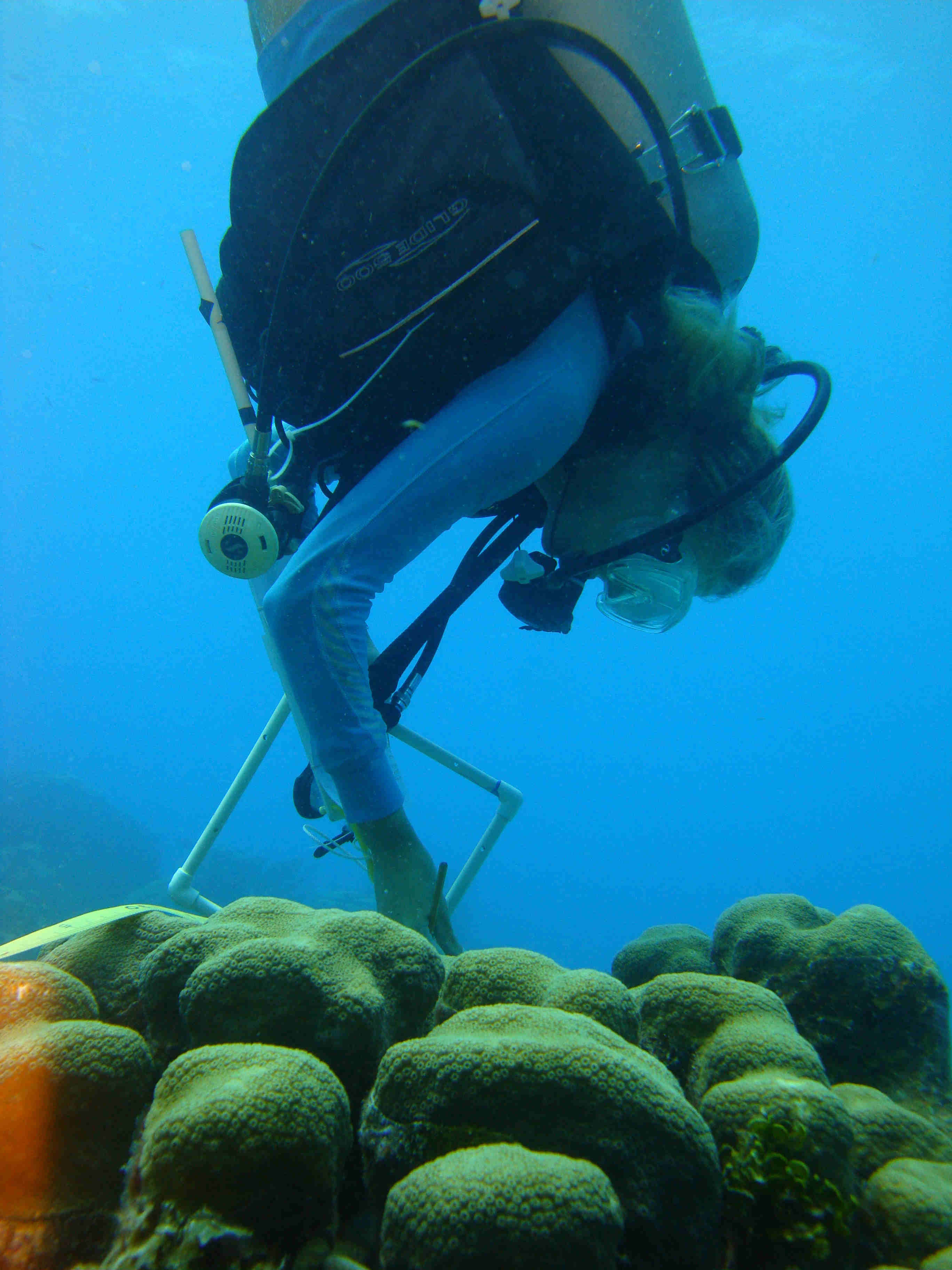This article was co-authored with Carrie Manfrino, PhD, Kean University, Department of Geology and Meteorology and Director of Research and Conservation, Central Caribbean Marine Institute, Little Cayman, Cayman Islands.
Maintenance of Mid-Tower -- The Coral Reef Early Warning System (CREWS) installed at the Central Caribbean Marine Institute's Field Station on Little Cayman provides near-real time data for measuring thermal stress in the ocean. Dr. Carrie Manfrino, Kean University Associate Professor, is shown here making adjustments to the instruments that have provided the data for the Cayman Island's study.
We have all seen examples of global weirding when it comes to weather, with more and more examples of severe weather, ranging from tornadoes to floods to swings in temperature, including the historic snow storms that much of the nation is experiencing this week. Nature's toll is seen on both land and in our oceans.
One of us (CM) has been studying the effect of prolonged temperature swings on coral reef communities in the Caribbean where the corals have been reduced to rubble at many sites. Some scientists are reporting that in 2005, Caribbean corals were in crisis due to thermal stress and bleaching. In 1998, before CM's scientific team arrived at Little Cayman, while the Pacific Ocean was under the spell of one of the worst ENSO events (El Nino Southern Oscillation -- a linked atmospheric-oceanic system during an El Nino event) on record, the reefs in the Caribbean were experiencing the worst coral bleaching event ever recorded.
The massive coral, Montastraea annularis, that has dominated Caribbean reefs for much of the late Pleistocene, is shown here. This coral has suffered across the region from multiple bleaching events. With the loss of the major reef building species, scientists are predicting another major decline in reefs.
Annual studies at Little Cayman, a relatively undeveloped island with only 150 residents, documented by CM as a massive decline of over 40% of the stony coral between 1999 and 2004. In Dr. Eakin's article, 56 different scientists teamed up to report a regional bleaching event in 2005 that affected reefs across the Caribbean. The rising temperature of the world's oceans is a leading factor in the demise of coral communities. Even though the 2005 event resulted in the most extensive bleaching event ever recorded, the reefs at Little Cayman recovered and coral communities stabilized with little additional mortality occurring in the following years.
Other sites were not so fortunate. However, thermal stress in 2009 resulted in large scale bleaching at Little Cayman, but little bleaching around the Caribbean. We are learning that thermal stress levels differ from place to place and that bleaching thresholds also vary from place to place. CM's research team will be reporting soon on how these thresholds vary from Little Cayman to Florida. The bad news is that the once dominant massive coral species, Montastraea annularis, appears to be the most susceptible to bleaching stress. The larger implication is that as corals die off the structural integrity of the reef is compromised. It is the corals that provide the architectural framework for myriad organisms that live in and around reefs. This is the equivalent of becoming an environmental refuge!
The more we understand about how sustained temperature increases and global weirding affects these precious coral communities, the better prepared we will be to respond to regions in crisis.
National Oceanic and Atmospheric Administration. Coral Reef Watch - Coral Bleaching HotSpots. [Updated 24 September 2009; cited 29 March 2010].
National Oceanic and Atmospheric Administration. National Data Buoy Center - Station LCIY2. [Updated 9 March 2010; Cited 29 April 2010].
A version of this article was originally published at The Huffington Post.
- Log in to post comments




When is this global warming scam going to end? Just wondering.
Tell you what Jack, hold your breath waiting.
Your comment is perplexing, because my article does not address global warming.
Ah Jeff you are dealing with people that don't read things, they are just triggered by some keywords and have a meaningless comment loaded for a quick delivery.
It would seem intuitive that tropical corals would be able to cope with warmer temperatures. Do cooler water corals, e.g. in Fiordland, New Zealand, show any less resilience?
It amazes me that people don't get it. Climate and temperature are not the same! Extremes in conditions and temperatures, both summer and winter is evidence of climate change.
"The rising temperature of the world's oceans is a leading factor in the demise of coral communities".
This matter-of-fact statement in your article, Jeff, would lead readers to belive you are talking about global warming.
Warming, yes, locally. Global - no. That's the point, in addition to the very important distinction between weather (day to day) and climate (long term trends.)
Your comment is perplexing, because my article does not address global warming.
"...Your comment is perplexing, because my article does not address global warming..."
Beauty. Good point. You are just talking about the impacts on the biosphere from the warming oceans. Nobody with half a brain denies CO2 levels are rising. The debate is about potential ramifications.
Don't worry. Be happy.
http://biodiversivist.blogspot.com/2011/01/book-review-rational-optimis…
Good information. Thanks...